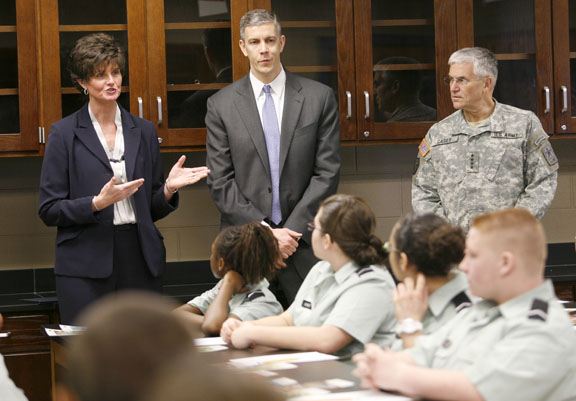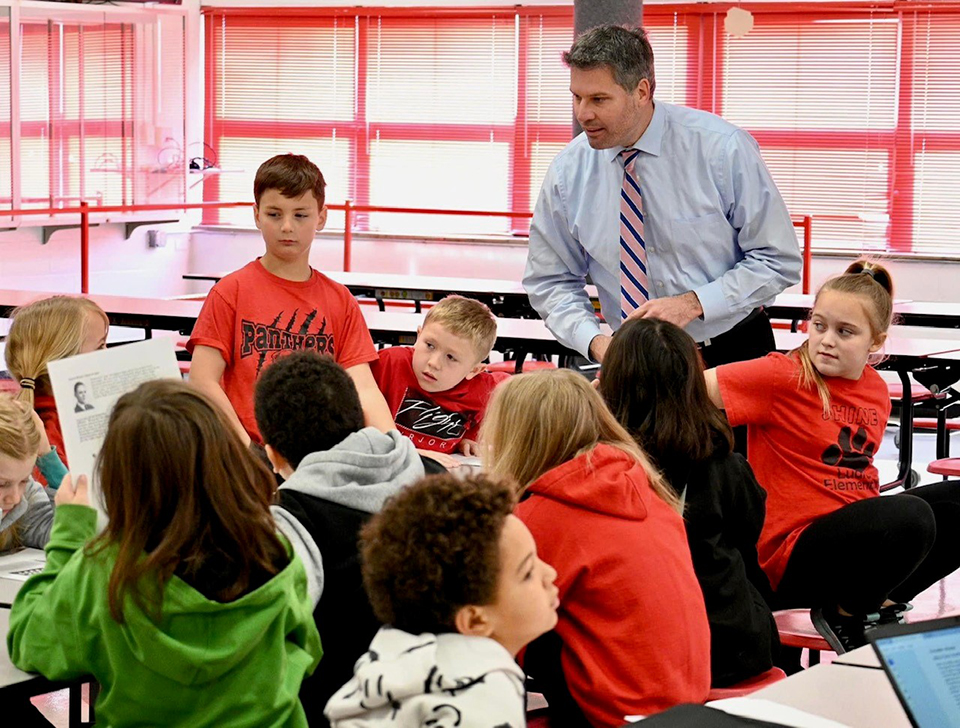
Hardin County Schools Superintendent Nannette Johnston introduces U.S. Secretary of Education Arne Duncan and Gen. George W. Casey Jr., chief of staff of the U.S. Army, to a Junior Leadership Corps class at North Middle School (Hardin County) March 11, 2011. The two were visiting the school to launch Project Partnership for All Students’ Success (PASS). Photo by Amy Wallot
By Matthew Tungate
matthew.tungate@education.ky.gov
Even though students have been taking Junior Leadership Corps (JLC) classes since only January at North Middle School (Hardin County), Principal Laura McGray already can see the benefits.
A 7th-grade student in the Junior ROTC-like class found a $10 bill in his uniform, and he returned the money to the instructor.
“To a 7th-grade student who doesn’t have much, that $10 bill was a gold mine,” McGray said. “This is a young kid who never would have done that two or three weeks ago. It shows that a program like this truly can make a difference in a child’s life.”
North Middle hosted the March 11 national launch of Project Partnership for All Students’ Success (PASS), of which JLC is part. U.S. Secretary of Education Arne Duncan; Gen. George W. Casey Jr., chief of staff of the U.S. Army; and Brenda Welburn, executive director of the National Association of State Boards of Education (NASBE), attended the ceremony.
Project PASS offers JLC elective courses in middle school, a JROTC program in high school and after-school activities to develop character and leadership with the goal of keeping students in school and improving their chances for a successful life. Project PASS was established through a partnership between the U.S. Army and NASBE.
A recent NASBE report found that educators who apply military-style education programs for students develop and sustain community partnerships for the benefit of students, and implementing leadership training programs such as JROTC affect student achievement. Project PASS will use a military-influenced leadership curriculum to help students develop strength of character, self-confidence and academic discipline to supplement their academic training.
North Middle and James T. Alton Middle schools in Hardin County, and Hopkinsville Middle and North Drive Middle schools in Christian County are among those participating in the program. The other districts are Miami-Dade, Fla.; Gwinnett County, Ga.; and Garden City, Kan.
Project PASS rooted in prepared graduates
The idea for Project PASS came from a joint meeting between military and business leaders, both of which were finding qualified workers in short supply, Casey told the crowd gathered for the ceremony. Fewer than one in four 17-24-year-olds qualifies for the military, he said.
He recognized Welburn and Lt. Gen. Benjamin Freakley, the commanding general of Fort Knox and the Army Accessions Command (the human resources segment of the service), for working together to create Project PASS.
“It’s all focused around providing an opportunity for every one of these magnificent young men and women here today to succeed, to get the education, to build the leadership skills that they need to go on to achieve whatever their dream may be,” Casey said. “And America is a lot of things, but it’s still a country of dreams.”
Welburn told the crowd that a student drops out of school every 26 seconds – that’s 1.2 million per year.
“Such statistics suggest that waiting cannot be tolerated and hoping is not a strategy,” she said.
Project PASS is a partnership of people, students, parents, teachers, administrators, communities and institutions working to motivate and equip all students to graduate and be well-prepared to see success in their lives and work after high school, Welburn said.
“Project PASS enables students to succeed by developing their leadership and citizenship skills, deepening their global perspectives, engaging and motivating them in their academic pursuits, and connecting them with their community,” she said.
JLC in the classroom
JLC, the middle school curricular component of Project PASS, draws on the best practices of middle schools around the country and JROTC, whose students have higher graduation rates, higher grades, higher test scores, and greater participation in the military and college, she said.
The JLC curriculum focuses on leadership, development, academic achievement, fitness, citizenship and service, and supports the transition from middle school to high school, Welburn said.
McGray was a teacher and assistant principal at North Hardin High School before becoming principal at North Middle. Within months of getting to North Middle, she called the JROTC instructor at North Hardin High and asked if there was a middle school version.
“I could see the great need because we have students that come from very varied backgrounds, and usually high structure is one the things they crave and need,” she said.
But at the time there was no such program.
When central office administrators called last year and offered her an opportunity to participate in Project PASS, “I jumped all over it,” McGray said.
Seventh- and 8th-graders had to apply to be in JLC, she said, and 91 were accepted.
“We looked more at which students have potential to be leaders but are not necessarily tapping into that potential,” McGray said. “Now, am I going to say that we’ve got some that have less-than-stellar behavior records? We do. But oftentimes they are leaders – they just have not been leading in the correct way.”
Amy Anderson, an 8th-grader at North Middle School, told the crowd that the JLC class has changed her.
“I was always timid. Getting up in front of a crowd large or small was a nightmare for me. JLC gave me the courage to get up and speak to you today,” she said. “Overall, JLC has taught me to become a better person.”
Austin Davis, an 8th-grader at James T. Alton Middle School, said JLC changed his life by improving his attendance, grades and attitude.
“JLC has been an inspiration to me and my friends involved in this program. We can overcome adversities that before JLC would seem to be too challenging and of little importance,” he said.
“This program turns students into leaders just like the JLC creed says, ‘The future of my country depends on me.’”
JLC Instructor Neal Gibbs retired from 27 years in the Army in early January and days later was in the classroom. Gibbs said he was a substitute teacher in Hardin County before retiring, and he knew the job of JLC instructor was for him.
“My philosophy is, if I can get a child motivated to learn, then I have done my job,” Gibbs said.
He teaches students about setting goals, taking responsibility for their actions and the need for an education. He also tries to teach them about civic responsibility and that they shouldn’t turn their back if they see something wrong “because if you don’t fix the problem, you’re part of the problem.”
As part of JLC, students wear a uniform one day a week. Gibbs said that alone has helped students have more confidence and self-control – because they are more noticeable.
“I tell them, ‘You’ve got to be the cream of the crop. People are going to be looking at you now, so all the other stuff you used to do, you need to quit doing it,’” he said.
Besides teaching, Gibbs also mentors JLC students. He said he goes to their non-JLC classes to watch them, and he works with other teachers on ways to reach his students.
“I’m just trying whatever I can to get these guys motivated and just stay in school,” Gibbs said.
Besides JLC instructors, each school district has a community coordinator who connects students to tutoring; mentoring; fitness; art; science, technology, engineering and mathematics enrichment; and career planning, Welburn said.
“It is our intent that Project PASS will become a 365-day initiative to make sure our students succeed,” she said.
The future of Project PASS
Duncan said there are no good jobs for high school dropouts, and communities and schools can’t wait to intervene until students are juniors and seniors in high school “where often, frankly, it’s too late – we’ve already lost those children to the streets.”
Once the three-year pilot program is over, the task is to figure out how to take the program national, Duncan said.
“It’s in its early days here, but you don’t have to be a genius to look around that room and see the positive impact this program is having,” he said.
Duncan told the crowd of mostly JLC students that sometimes he goes to schools and he worries about the future.
“Because of you, I’m very, very hopeful about where this country is going,” he said.
MORE INFO …
National Association of State Boards of Education
Laura McGray, laura.mcgray@hardin.kyschools.us, (270) 352-3340



Leave A Comment